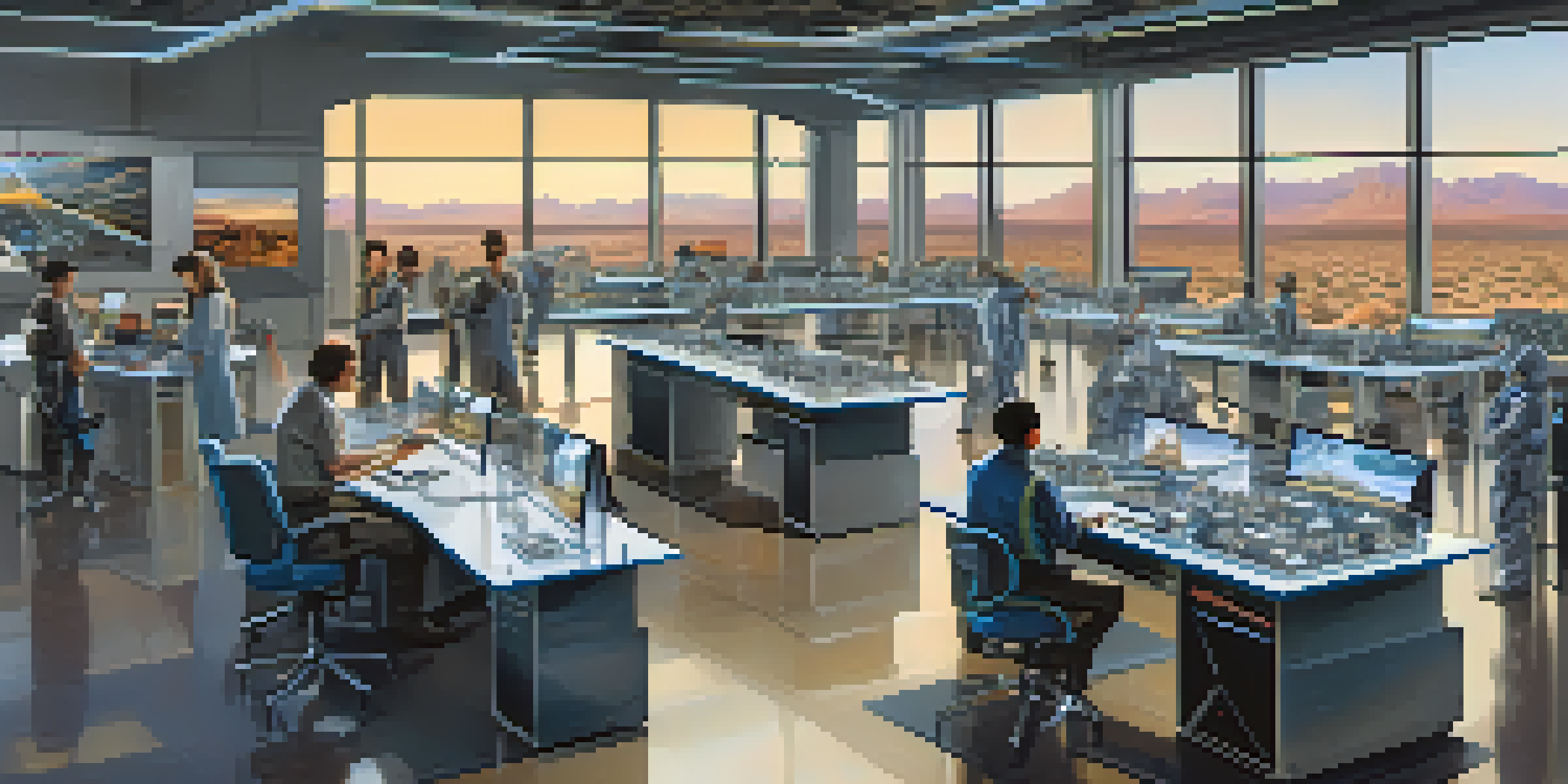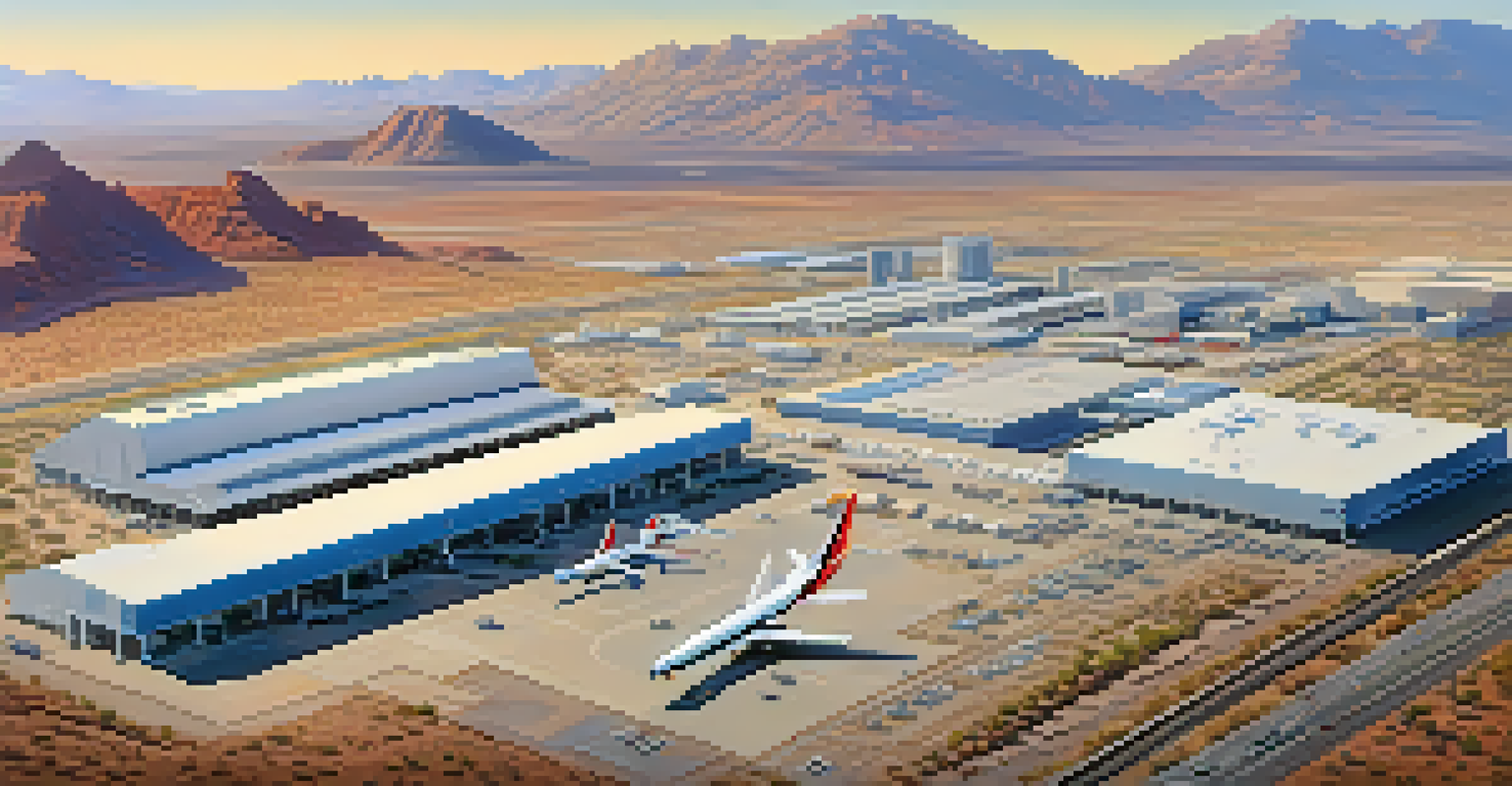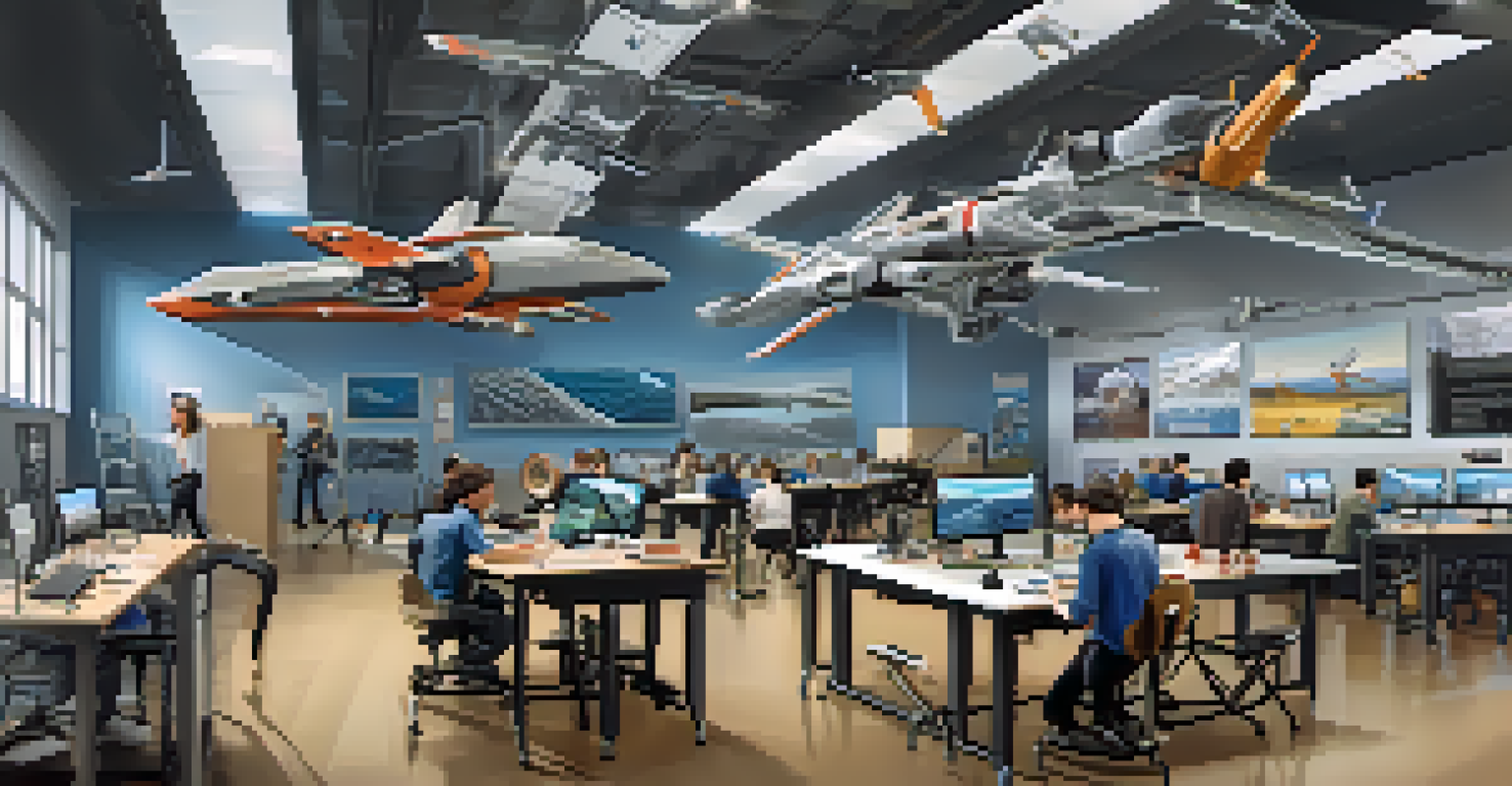Arizona's Aerospace Industry: A New Frontier for Economic Growth

Overview of Arizona's Aerospace Landscape
Arizona has emerged as a key player in the aerospace industry, boasting a rich history of innovation and technological advancements. From the early days of aviation to modern space exploration, the state has consistently attracted top talent and investment. The presence of major companies and military installations has solidified Arizona's reputation as a hub for aerospace development.
The aerospace industry is a cornerstone of Arizona's economy, driving innovation and creating jobs that support families and communities.
The state's strategic location, with proximity to key markets and a skilled workforce, makes it an ideal environment for aerospace growth. Cities like Tucson and Phoenix are home to a diverse range of aerospace companies, from startups to established giants. This vibrant ecosystem fosters collaboration and innovation, contributing to the industry's overall success.
As the demand for aerospace products and services continues to rise, Arizona is well-positioned to capitalize on these opportunities. The state's commitment to supporting the aerospace sector through education, research, and infrastructure development further enhances its competitive edge.
Key Players in Arizona's Aerospace Sector
Arizona's aerospace industry is home to several major players, including Raytheon, Boeing, and Honeywell Aerospace. These companies not only provide thousands of jobs but also drive significant economic activity in the region. Their presence attracts a network of suppliers and service providers, creating a robust supply chain that benefits everyone involved.

In addition to these large corporations, numerous small and mid-sized companies contribute to the ecosystem, bringing niche expertise and innovative solutions to the table. This diversity of players enhances the overall resilience of the industry, allowing it to adapt to changing market demands. The collaboration between different companies fosters a culture of innovation that is essential for growth.
Aerospace Industry's Economic Impact
The aerospace sector significantly boosts Arizona's economy by generating billions in revenue and supporting tens of thousands of jobs.
Moreover, partnerships with local universities and research institutions play a crucial role in sustaining the talent pipeline. Programs that emphasize STEM (science, technology, engineering, and mathematics) education help cultivate the next generation of aerospace professionals, ensuring the industry remains strong for years to come.
Economic Impact of Aerospace on Arizona
The aerospace industry significantly contributes to Arizona's economy, generating billions in revenue and supporting tens of thousands of jobs. This economic impact extends beyond direct employment; it also stimulates growth in related sectors such as manufacturing, logistics, and services. When you consider the ripple effect, the benefits of a thriving aerospace industry are felt throughout the state.
Innovation in aerospace is not just about technology; it's about collaboration and education to ensure a skilled workforce for the future.
Additionally, the aerospace sector attracts investment from outside the state, bringing in capital that fuels further development. This influx of funding helps to improve infrastructure and create new opportunities for local businesses. The result is a dynamic economic environment that encourages entrepreneurship and innovation.
Furthermore, as aerospace companies expand their operations, they often engage in community initiatives, supporting education and workforce development. This commitment to corporate social responsibility strengthens the bond between the industry and the communities it serves, creating a more sustainable economic ecosystem.
Innovations Driving the Future of Aerospace
Innovation is at the heart of Arizona's aerospace industry, with companies continually pushing the boundaries of technology. From advancements in drone technology to the development of next-generation aircraft, the state is leading the charge in aerospace innovation. These breakthroughs not only improve efficiency but also contribute to sustainability efforts within the industry.
The growth of space exploration has also become a focal point, with Arizona-based companies involved in satellite technology and space missions. This burgeoning sector is attracting significant investment and interest, positioning Arizona as a key player in the future of space travel. The potential for commercial spaceflight and satellite services presents exciting opportunities for growth.
Innovation Drives Aerospace Growth
Continuous advancements in technology, such as drone development and space exploration, position Arizona as a leader in aerospace innovation.
Moreover, initiatives such as public-private partnerships and research collaborations are essential for driving innovation. By leveraging resources and expertise from various sectors, Arizona's aerospace industry can continue to stay ahead of global trends and challenges.
Educational Institutions Supporting Aerospace Growth
Educational institutions in Arizona play a vital role in nurturing the workforce needed for a thriving aerospace industry. Universities such as Arizona State University and the University of Arizona offer specialized programs in aerospace engineering, providing students with the skills and knowledge required to excel in the field. These programs often include hands-on experience through internships and research projects, bridging the gap between education and industry.
Additionally, community colleges in the state provide accessible pathways for students to enter the aerospace workforce. Programs focused on technical skills, such as avionics and manufacturing, ensure that graduates are job-ready and can meet the demands of local employers. This focus on practical training is crucial for sustaining the industry's growth.
Moreover, partnerships between educational institutions and aerospace companies create opportunities for collaboration and knowledge sharing. These alliances foster a culture of innovation and ensure that the curriculum remains relevant to industry needs, ultimately benefiting both students and employers.
Challenges Facing Arizona's Aerospace Industry
Despite its successes, Arizona's aerospace industry faces several challenges that could hinder its growth. One significant concern is the competition from other states and countries that are also investing heavily in aerospace capabilities. This competition can make it difficult for Arizona to attract top talent and secure funding for new projects.
Another challenge is the evolving regulatory landscape, particularly concerning environmental standards and safety regulations. Companies must navigate these complexities while continuing to innovate and expand. Striking a balance between compliance and growth is essential to maintaining the industry's momentum.
Education Fuels Workforce Development
Educational institutions in Arizona provide essential training and partnerships that equip students with the skills needed for aerospace careers.
Additionally, the ongoing skills gap in the workforce poses a risk to the industry's future. As technology advances, there is a growing need for skilled workers who can operate new systems and processes. Addressing this gap through targeted training and education programs will be crucial for sustaining Arizona's aerospace sector.
Future Outlook for Arizona's Aerospace Industry
Looking ahead, the future of Arizona's aerospace industry appears bright, with numerous opportunities for growth and innovation. As technology continues to evolve, the demand for aerospace products and services is expected to rise, providing a solid foundation for expansion. Arizona's strategic investments in infrastructure and education will further bolster its position as a leader in the sector.
Moreover, the increasing focus on sustainability within the aerospace industry aligns well with Arizona's efforts to promote clean technologies. Companies that prioritize environmentally friendly practices will likely gain a competitive edge, attracting environmentally conscious consumers and investors. This shift towards sustainability could redefine the industry's landscape in the coming years.

Ultimately, the collaborative spirit of Arizona's aerospace community will play a pivotal role in shaping its future. By working together to overcome challenges and seize opportunities, the industry can continue to thrive and contribute to the state's overall economic growth.